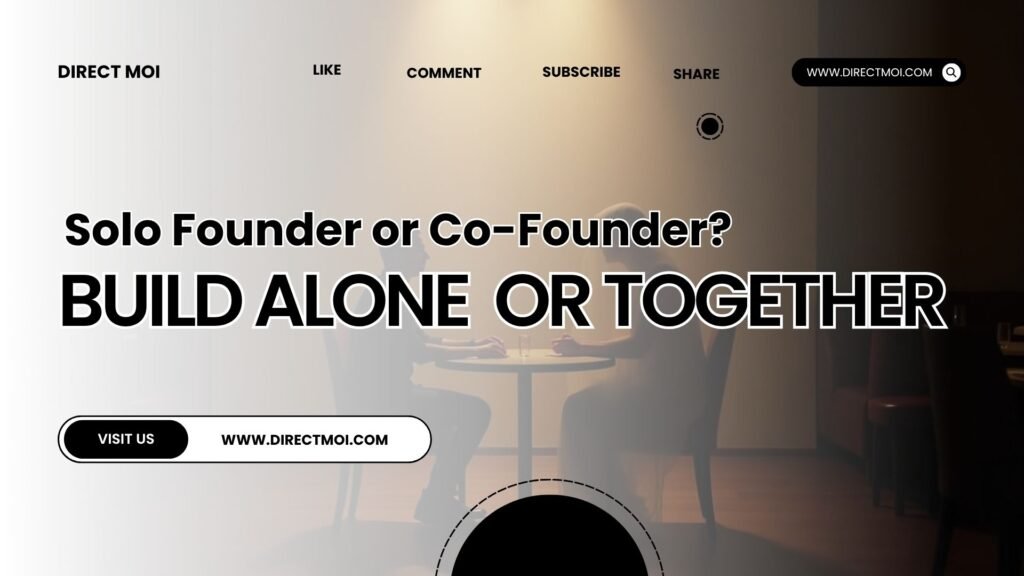
Why Read This Blog?
Starting a restaurant is a big leap, and one of the most important early decisions you’ll make is whether to go solo or find a co-founder. This choice will shape your leadership, daily operations, and even the brand itself. This blog will help you weigh the pros and cons, understand your working style, and make a confident decision.
Solo Founder or Co-Founder?
“If everyone’s serving something, what’s not being served?”
Hello and welcome to Direct Moi. Today’s topic is all about ” Solo Founder or Co-Founder? ” let’s dive in.
Picture this:
The restaurant is silent. No plates clinking, no aromas in the air. Just you, seated at a single table in the center of your dream — a vision made of flavors, textures, and late-night brainstorms. Across from you? An empty chair.
It’s more than just furniture. That chair holds a question — one that could shape your entire journey.
Do you keep it empty… or invite someone to fill it?
Will you be a solo founder, charting your path alone?
Or will you bring in a co-founder to share the map, the journey, and the destination?
Going solo offers something powerful:
Uncompromised vision. Every creative detail, every brand message, every dish — it all flows directly from you. You get to move quickly, pivot sharply, and maintain full control. But there’s a weight to carrying everything. From financing to staffing, from marketing to late-night fixes, it’s all on your shoulders.
On the other hand, sharing the table can be transformative.
A good co-founder can challenge your blind spots, double your capacity, and share your burdens. The laughs are louder, the wins feel bigger. But partnership also means compromise. It demands trust, patience, and the courage to navigate conflict — like when visions don’t align or responsibilities overlap.
So as you sit in this imagined restaurant, staring at that empty chair, ask yourself:
What do you need most on this journey?
Creative freedom… or shared strength?
Speed… or balance?
Legacy built alone… or a story co-written?
There’s no right or wrong answer — just the one that fits your values, your personality, and your dreams.
Because whether you lead the kitchen solo or with someone by your side, the restaurant’s heart will always reflect you — your decisions, your passion, your vision.
Stay tuned to Direct Moi for more insights — see you in the next one!
Key Takeaways
- Clarity of Vision: Going solo gives full creative control, but can be isolating during setbacks.
- Shared Strength: Co-founders bring diverse skills and shared responsibilities but require aligned values and strong communication.
- Decision Dynamics: A solo founder can act fast, while partners must negotiate.
- Workload Distribution: A partner can lighten the operational load and emotional burden.
- Long-Term Growth: Think beyond launch — scalability, exit plans, and investment can look different depending on your structure.
Common Pitfalls to Avoid
- Jumping into partnerships without a clear legal or equity agreement.
- Choosing a partner based on friendship instead of complementary skills.
- Underestimating the loneliness or burnout risk as a solo founder.
- Failing to define roles and expectations early.
- Avoiding tough conversations about money, exit strategies, or vision.
Frequently Asked Questions
- Q: Is it better to go solo to avoid conflict?
A: Not always. While it avoids certain conflicts, it can lead to burnout. Good partnerships can increase resilience. - Q: Can I bring in a co-founder later?
A: Yes, but it may be harder to find someone aligned after things are already set. - Q: How do I know if someone is a good co-founder?
A: Look for complementary skills, shared vision, and the ability to disagree productively. - Q: Should I split everything 50/50 with a partner?
A: Not necessarily. Equity should reflect effort, risk, and contribution. - Q: Can I build a great restaurant brand alone?
A: Absolutely. Many successful founders do. But it takes clarity, commitment, and a strong support network.
Exercise
- Write down your biggest strengths and weaknesses as a leader.
- List all the skills and roles required to run your restaurant.
- Highlight what you can realistically handle yourself vs. where you’d need help.
- Reflect on how you make decisions — do you prefer collaboration or independence?
- Imagine your best-case and worst-case scenarios both with and without a co-founder. What feels more aligned?




